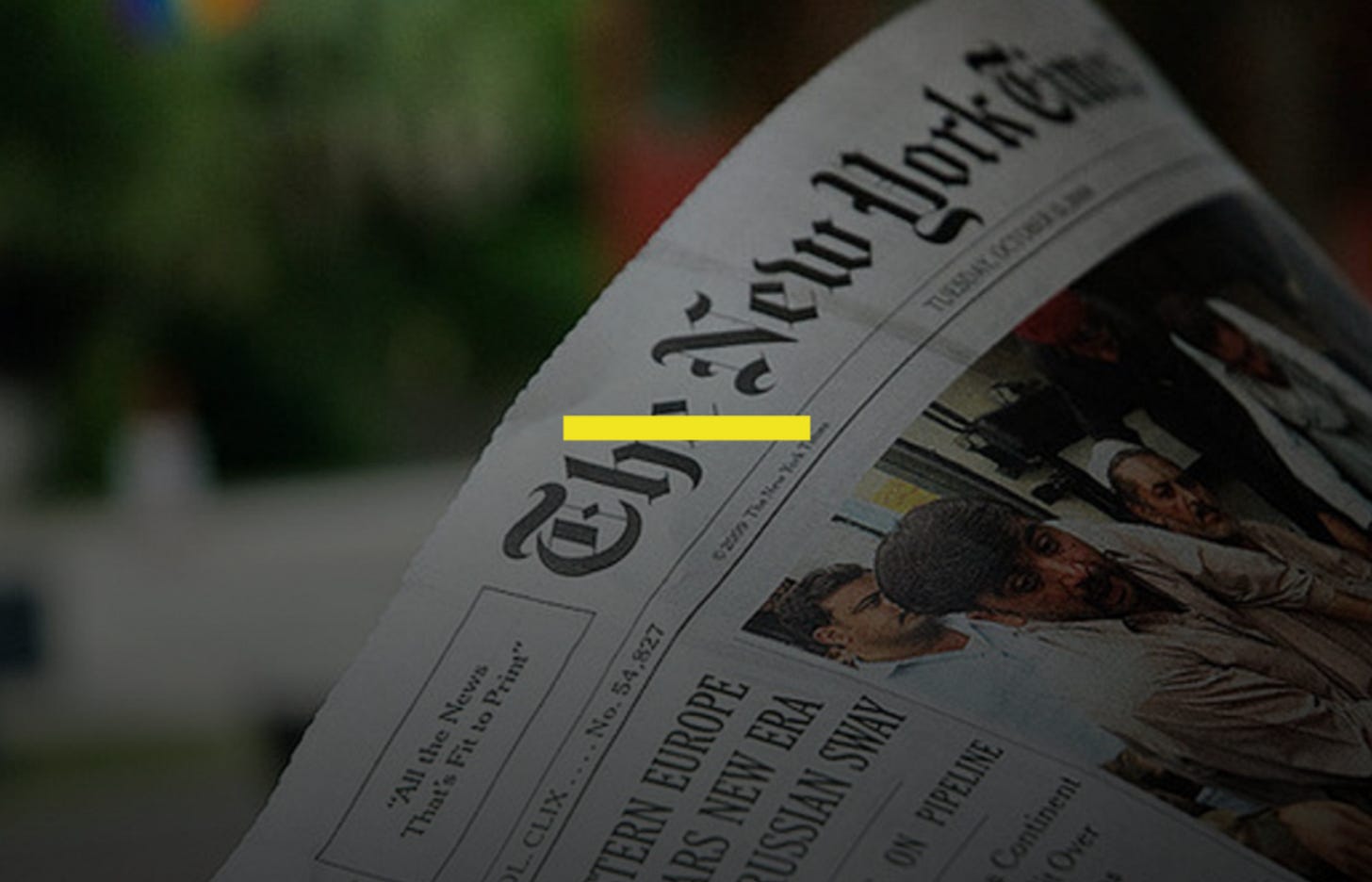The New York Times Has a Serious Headline Problem
The New York Times wrote a sharp editorial last week ripping “right-wing extremists” for blocking renewed funding of a U.S. program to fight AIDS overseas. The Times called out Republicans for being “eager to politicize a once-bipartisan issue.”
But the Times’ headline for that editorial was a vague and cowardly effort:
“Partisan Politics Put a Huge Win for Public Health at Risk”
As if the villain was a shadowy monster named “politics,” not Republicans.
Sometimes a misguided headline in the Times reflects the misguided text underneath it. But as the “partisan politics” headline shows, even when the Times gets serious about right-wing extremism, its headlines often do not.
For example, when Alabama Republicans defied a Supreme Court ruling, the Times made the ruling seem optional: “Alabama Lawmakers Decline to Create New Majority-Black Congressional District.”
When Gov. Ron DeSantis went on a book-banning and educator-harassment campaign in Florida, the Times found the bright side: “DeSantis Takes on the Education Establishment, and Builds His Brand.”
Over the Labor Day weekend, President Joe Biden inspected Florida hurricane damage and expressed a willingness to appear with Gov. Ron DeSantis, but DeSantis declined. Yet the Times headline put the onus on Biden: “Biden Won’t Meet DeSantis in Florida During Tour of Hurricane Damage.” After that headline raised dust on social media, the Times changed it to “DeSantis and Biden Won’t Meet in Florida During Tour of Hurricane Damage.” That still didn’t pin the incivility on DeSantis, where it belonged. Later in a follow-up story, the Times wrote a third headline that still didn’t blame DeSantis: “In Florida, Even a Hurricane Can’t Sweep Away Presidential Politics.”
Headlines like that last one create a “safe space” for the Times by suggesting that no one is at fault or everyone is. When the Republicans engineered the debt ceiling crisis last spring, the Times wrote a story headlined “Finger-Pointing Won’t Save Anyone if Default Leads to Economic Collapse.”
This tendency goes well beyond headlines, of course. The Times’ chief White House correspondent, Peter Baker, got appropriate criticism for his recent tweet blaming America’s political divisions on ”tribalism.” Baker seems not to understand that the Republican Party has taken a fascist turn that the rest of us find alarming. Our opposition is not “tribalism” – it’s basic human decency.
Even when the Times isn’t talking directly about partisan politics, its negative spin on America’s well-being bolsters the Republicans’ relentless criticism of Biden. A Times headline in July said:
“Despite Successes at NATO Summit, Divisions Remain.”
The headline could have said, “Despite Divisions, NATO Summit Logs Successes.” But the Times postured as savvy and sophisticated by going negative. This tendency is especially common with economic stories. Three examples this year:
“Why a Strong U.S. Economy Is Making Stock Investors Jittery”
“Against the Odds, the U.S. Economy Chugs Along, as Fears Linger”
“Inflation Has Been Easing Fast, but Wild Cards Lie Ahead”
Of course, the economy will always feature “fears” and “wild cards.” Investors will always be “jittery.” This is not news.
Last weekend, a New York Times noted the nation’s strong economic trends in a story headlined “Biden Struggles to Make ‘Bidenomics’ a Plus, Not a Minus.” But why is Biden struggling? Because the Times and other news media are not clearly delivering the facts.
Big business often catches a break in Times headlines. When inflation rose because of obvious price gouging (including record profits for oil companies), the Times wrote: “Companies Push Prices Higher, Protecting Profits but Adding to Inflation.” Ah, “protecting profits” – sounds nice!
The Times’ timid approach to headlines is a gift to corrupt politicians. A glaring example was the Times’ initial hesitancy to call Trump’s lies “lies.” The Times uses that word a bit more often now, but it still twists itself in knots to find odd euphemisms. A headline last week said: “Emulating Trump, Ramaswamy Shows a Penchant for Dispensing With the Facts.”
Another political bad actor who got friendly treatment from the Times headline writers was Italy’s notoriously corrupt Silvio Berlusconi. His Times obituary headline called him a “Showman Who Upended Italian Politics and Culture.” (That see-no-evil outlook shows up in stories too. The Times has repeatedly described Trump ally Bernard Kerik as a “former New York City police commissioner,” leaving out the part where he did prison time for tax fraud and lying to investigators.)
The Times’ framing of politics matters because a lot of news organizations mimic its approach. And also because the Times doesn’t just report the news – it makes the news. The Times’ acceptance of false claims that Saddam Hussein was building weapons of mass destruction helped justify the disastrous war in Iraq. Its over-the-top coverage of Hillary Clinton’s private email server helped put Trump in the White House.
When the Times is good, it’s very good – even on politics. Examples include a smart explainer graphic on Trump’s coup attempt and a refreshingly direct assessment of Rep. Elise Stefanik’s cynical embrace of Trumpism.
But too often it falls short, writing headlines that sand down the sharp edges of Republican extremism. If only the Times would give us this headline:
“New York Times Finally Realizes That the Rise of Fascism Is Not Normal and Vows to Defend Democracy.”
Now, that would be worth a subscription.




So does WaPo. Their headlines not only minimize or demean Democrats, they throw in gratuitously fpotus's name in nearly every article about Democrats. It is clear MSM cares only about clickbait entertainment, and pushing the celebrity hound Republican candidate.